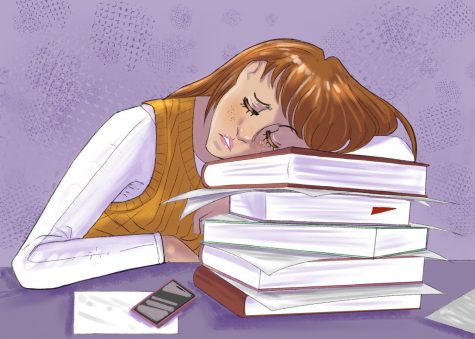Opinion: American Workplace Culture is Burning Us Out
December 16, 2021

Not long ago, my education took a back seat to my job.
I was working almost full-time as a server at Buffalo Wild Wings and nannying on the side to pay my expenses, all while taking nine college credit hours. I was lost and behind. Then the COVID-19 pandemic hit, and I lost my serving job.
Initially, that was stressful, but fortunately, I received government aid — and each day, I woke up with relief because I did not have to attend to a job I hated. I found joy in activities that my job and school had not left time for.
I had finally found what I was yearning for — time. I had time to cook, read, garden, bike and learn more about the world. I reconnected with myself. I began to enjoy life.
All of these experiences told me that our country has a problem with work—a problem with being overworked and a religion of working endless hours. Weekends are not really weekends when we just work through them, and sixty hours of work or more a week is exhausting.
My mental and physical state was affected as a result of overworking myself over the past four years. I felt the effects and developed extreme anxiety and clinical depression. I lost weight and had trouble sleeping.
According to an article published by The American Institute of Stress, work-related stress causes 120,000 deaths and results in $190 billion in health care costs each year. The article also said Americans are among the most stressed people in the world, and that stress has started creeping in at younger ages and now presents a bigger global problem than it had been two or three decades prior.
We have a window of tolerance for stress, said Pam Bult, a therapist at Heritage Professionals. There is a positive aspect of being exposed to the workforce and its accompanying stress early in life: You are more prepared for long hours later.
“You have more skin in the game,” Bult said. “But high stress over a longer period of time can result in a shorter fuse.”
Meg Quinn is a junior art history major, who works at Cadence Kitchen & Co. as a server.
“It is important for me to work because the cost of a degree has grown so much,” Quinn said. “Work-life balance is definitely difficult, and adding schoolwork into the mix adds more stress.”
The COVID-19 pandemic has only made our stress levels worse. According to a survey done by Ohio State’s office of the Chief Wellness Officer, burnout among their student body was up to 71% in the spring as opposed to 49% that was reported in the fall of 2020, and in a report published by USA Today on Oct. 13, it was said 4.3 million people quit their jobs in August.
The report by USA Today also noted that Robert Reich, professor at the University of California, Berkeley, and a former U.S. secretary of labor, wouldn’t call the situation a labor shortage.
“This is a living wage shortage, a hazard pay shortage, a childcare shortage, a paid sick leave shortage, and a health care shortage,” he wrote on Twitter. “American workers are rising up to demand better treatment.”
People are fed up.
At one point, I considered dropping out of college due to the weight of my burnout fatigue. I was creating high expectations for myself — most were unrealistic, and I compared myself to other students, which took a strong toll on my mental health.
My father, Thomas Tylka, worked downtown as a bike messenger and mailroom clerk when he attended the University of Illinois Chicago 25 years ago.
“I made decent money but still struggled doing everything,” Tylka said. “But that is what life is.”
Why can’t work-life balance be part of the American lifestyle?
Feeling burned out earlier in life seems to be a given, and that is what is most concerning to me.
How can we stop working so hard? We could start with checking in with our own mental health, and companies and educational institutions can contribute to this by offering more mental health days and having more open discussions on the social aspect of what it means to be “successful.”
We need to stop comparing ourselves to others, setting the bar too high and taking on too much for ourselves to handle. At just 23, I am tired. If we keep working the way we do, we might risk a lot more in our future than just our jobs.
Caitlin Tylka is a junior at Columbia majoring in journalism with a concentration in news and features.







